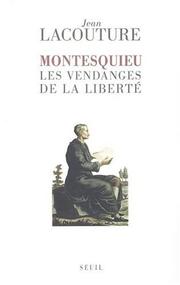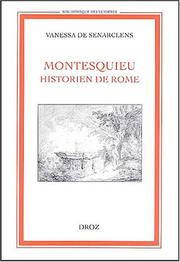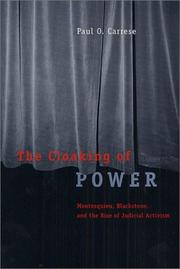| Listing 1 - 3 of 3 |
Sort by
|

ISBN: 2020535653 9782020535656 Year: 2003 Publisher: Paris Seuil
Abstract | Keywords | Export | Availability | Bookmark
 Loading...
Loading...Choose an application
- Reference Manager
- EndNote
- RefWorks (Direct export to RefWorks)
Montesquieu, de, Charles-Louis de Secondat --- Authors, French --- Philosophers --- Montesquieu, Charles de Secondat, --- Montesquieu --- Mengdesijiu, --- Mongtētkiʻǣ, --- Monteskʹe, Sharlʹ Lui, --- Monteskīĭ, --- Monteskiusz, --- Monteskiyü, --- Monṭesḳyeh, --- Montesquieu, --- Montesquieu, Charles Louis de Secondat, --- Montesquiou, --- Montesukyū, --- Muntisikyū, --- Secondat, Charles-Louis de, --- מונטסקייה --- モンテスキウ̄, --- 孟德斯鳩, --- Montesquieu, Charles de Secondat --- Literature --- 18th century --- Biography --- Authors, French - 18th century - Biography. --- Philosophers - France - Biography. --- Montesquieu, Charles de Secondat, - baron de, - 1689-1755 --- MONTESQUIEU (CHARLES DE SECONDAT, BARON DE LA BREDE ET DE), ECRIVAIN ET PHILOSOPHE FRANCAIS, 1689-1755 --- BIOGRAPHIES

ISBN: 260000856X 9782600008563 Year: 2003 Volume: .62 Publisher: Genève : Droz,
Abstract | Keywords | Export | Availability | Bookmark
 Loading...
Loading...Choose an application
- Reference Manager
- EndNote
- RefWorks (Direct export to RefWorks)
Montesquieu fit œuvre originale d’historien. Ses Considérations sur les causes de la grandeur des Romains et de leur décadence suffiraient à établir la modernité de sa démarche historique. Vanessa de Senarclens revoit pourtant l’ensemble de son œuvre et examine tout autant les recueils de notes, tels les Pensées, les Voyages et le Spicilège en sorte de recouper les principales notions associées au topos romain dont traite Montesquieu. Celles-ci instruisent successivement l'effet politique de Rome sur la France après le règne de Louis XIV, la spécificité de l'histoire romaine divulguée par l’herméneutique qu’en fait le dix-huitième siècle et, enfin, les implications épistémologiques de cette dernière dans la conceptualisation de l'histoire moderne. Si Montesquieu est le "jurisconsulte", cherchant à comprendre "l'esprit des lois", il est aussi l'historien des nations et, en l'occurrence, l'historien de la civilisation de référence que constitue l'ancienne Rome. Sa réflexion sur les lois est indissociable de sa contribution à un statut moderne pour l'histoire.
Historiography. --- Historiographie --- Montesquieu, Charles de Secondat, --- Rome (Italy) --- Rome (Italie) --- History --- Histoire --- Historians --- Mengdesijiu, --- Mongtētkiʻǣ, --- Monteskʹe, Sharlʹ Lui, --- Monteskīĭ, --- Monteskiusz, --- Monteskiyü, --- Monṭesḳyeh, --- Montesquieu, --- Montesquieu, Charles Louis de Secondat, --- Montesquiou, --- Montesukyū, --- Muntisikyū, --- Secondat, Charles-Louis de, --- מונטסקייה --- モンテスキウ̄, --- 孟德斯鳩, --- Criticism and interpretation. --- Rome --- de Montesquieu, Charles-Louis de Secondat, --- Historien --- --Historiographie --- --Rome ancienne --- --France --- --XVIIIe s., --- Considérations sur les causes de la grandeur des Romains et de leur décadence --- --Montesquieu, Charles de Secondat --- Knowledge --- Montesquieu, Charles de Secondat --- Views on philosophy of history --- Historiography --- Early works to 1800 --- --Historians --- --Historiography. --- Historians - France - Biography. --- Rome ancienne --- XVIIIe s., 1701-1800 --- de Montesquieu, Charles-Louis de Secondat, 1689-1755 --- France --- MONTESQUIEU (CHARLES DE SECONDAT, BARON DE LA BREDE ET DE), ECRIVAIN ET PHILOSOPHE FRANCAIS, 1689-1755 --- HISTORIOGRAPHIE --- ROME --- CRITIQUE ET INTERPRETATION --- FRANCE --- 18E SIECLE

ISBN: 1282537296 9786612537295 0226094839 9780226094830 9780226094823 0226094820 Year: 2003 Publisher: Chicago : University of Chicago Press,
Abstract | Keywords | Export | Availability | Bookmark
 Loading...
Loading...Choose an application
- Reference Manager
- EndNote
- RefWorks (Direct export to RefWorks)
How did the US judiciary become so powerful-powerful enough that state and federal judges once vied to decide a presidential election? What does this prominence mean for the law, constitutionalism, and liberal democracy? In The Cloaking of Power, Paul O. Carrese provides a provocative analysis of the intellectual sources of today's powerful judiciary, arguing that Montesquieu, in his Spirit of the Laws, first articulated a new conception of the separation of powers and strong but subtle courts. Montesquieu instructed statesmen to "cloak power" by placing judges at the center of politics, while concealing them behind juries and subtle reforms. Tracing this conception through Blackstone, Hamilton, and Tocqueville, Carrese shows how it led to the prominence of judges, courts, and lawyers in America today. But he places the blame for contemporary judicial activism squarely at the feet of Oliver Wendell Holmes Jr. and his jurisprudential revolution, which he believes to be the source of the now-prevalent view that judging is merely political. To address this crisis, Carrese argues for a rediscovery of an independent judiciary-one that blends prudence and natural law with common law and that observes the moderate jurisprudence of Montesquieu and Blackstone, balancing abstract principles with realistic views of human nature and institutions. He also advocates for a return to the complex constitutionalism of the American founders and Tocqueville and for judges who understand their responsibility to elevate citizens above individualism, instructing them in law and right.
Judicial process --- Political questions and judicial power --- Judicial power --- Liberalism --- Jurisprudence --- Law --- Judiciary --- Justiciability --- Power, Judicial --- Constitutional law --- Courts --- Implied powers (Constitutional law) --- Judicial independence --- Separation of powers --- Judicial activism --- Judicial power and political questions --- Act of state --- Administrative discretion --- Judicial review --- Jurisdiction --- Rule of law --- Decision making, Judicial --- Judicial behavior --- Judicial decision making --- Judges --- Procedure (Law) --- Political aspects --- History. --- Literary history --- Psychological aspects --- Interpretation and construction --- Montesquieu, Charles de Secondat, --- Blackstone, William, --- Mengdesijiu, --- Mongtētkiʻǣ, --- Monteskʹe, Sharlʹ Lui, --- Monteskīĭ, --- Monteskiusz, --- Monteskiyü, --- Monṭesḳyeh, --- Montesquieu, --- Montesquieu, Charles Louis de Secondat, --- Montesquiou, --- Montesukyū, --- Muntisikyū, --- Secondat, Charles-Louis de, --- מונטסקייה --- モンテスキウ̄, --- 孟德斯鳩, --- judicial activism, blackstone, montesquieu, law, legal system, political science, power, authority, judiciary, constitutionalism, democracy, spirit of the laws, separation powers, courts, juries, reform, tocqueville, hamilton, oliver wendell holmes jr, individualism, liberalism, nonfiction, lord mansfield, sovereignty, reason, history, due process, jurisprudence.
| Listing 1 - 3 of 3 |
Sort by
|

 Search
Search Feedback
Feedback About
About Help
Help News
News